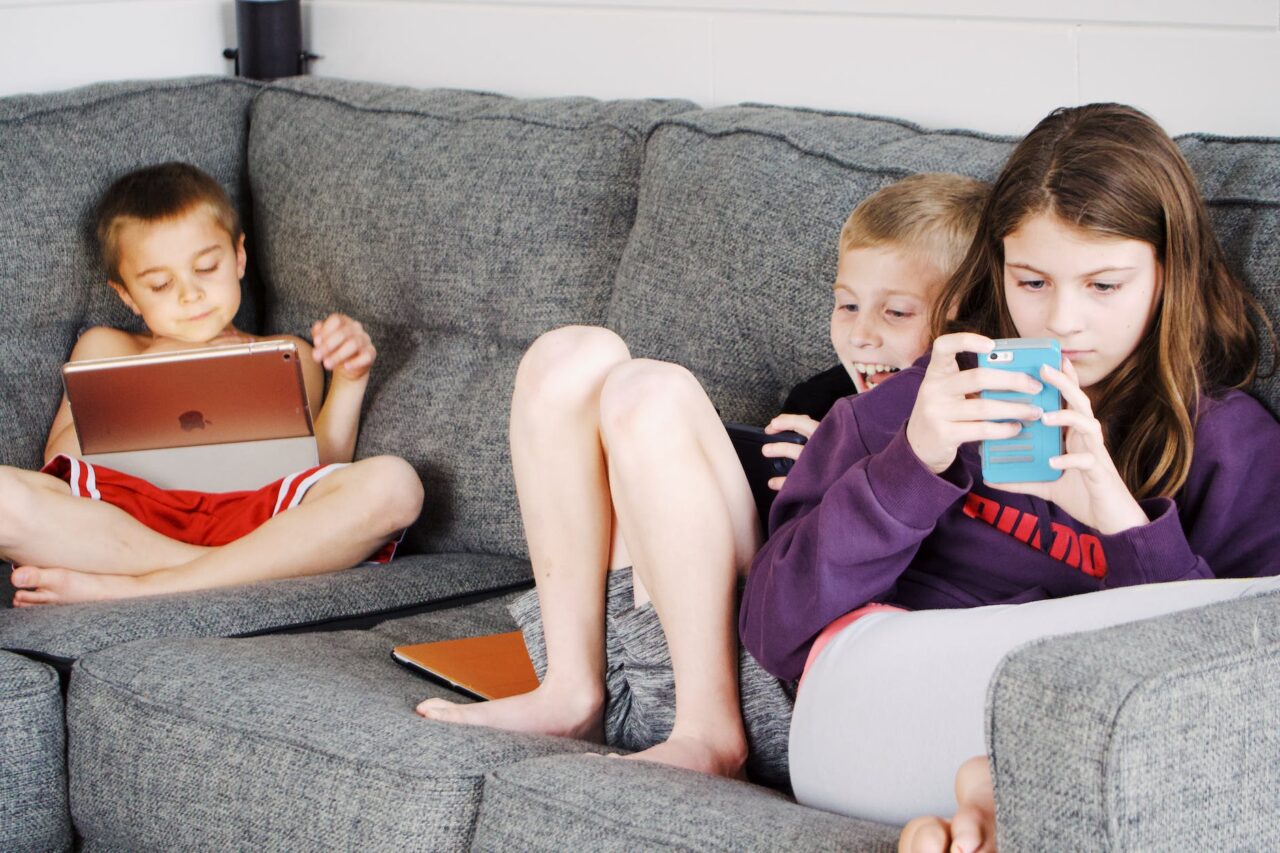
Should I let him play with a tablet?
Article published in Sciences Humaines magazine (Grands Dossiers n°39 – June 2015)
Televisions, tablets, computers… Screens continue to flourish in the world of young children, even though specialists advise against screen use before the age of 3. What risks does a child run?
Nathan, 18 months old, widens his eyes and makes a concentrated face – his mouth ajar – as if he’s just grasped the complexity of the big bang theory. In fact, he has just unlocked a touch-sensitive tablet. With his chubby little finger, he presses icons, launches videos and scrolls images, stroking the screen. His parents look on in admiration, finding their cherub quite dexterous. Ironically, on YouTube, we can see a cat trying to catch a small virtual fish with its right paw, on a tablet, with a skill comparable to Nathan’s! It’s a fact: the designers of these digital toys have succeeded in creating a product within the reach of a handful of mammals, human babies included.
Increasingly massive exposure to screens
Early childhood professionals are unanimous in their observation that contact with screens is becoming increasingly precocious and prolonged. In fact, it can begin as early as the maternity ward, when television interferes with the very first exchanges between mother and newborn. A few months later, the child becomes a consumer in his or her own right, able to spend hours on end with a remote control or tablet in hand. A veritable baby-sitter, the screen captivates the little spectator, giving overworked parents the temporary freedom to go about their business. Meanwhile, intrepid entrepreneurs are rubbing their hands: the baby tablet market is born. Their stated aim? Stimulate intelligence and learning in toddlers. A prospect that is sure to appeal to parents. And yet, these same designers are sometimes the last to put a tablet in the hands of their own children, with Steve Jobs and a few Silicon Valley executives in the lead. How can such a paradox be explained?
To find out, there’s nothing like getting inside the head of a child under the age of 3…
Tablets and babies are not compatible
Contrary to popular belief, a young child does not need a sophisticated environment to develop cognitively. Their intelligence, described by Jean Piaget as sensorimotor intelligence, develops as they experiment with their environment through their senses: touch, sight, smell, hearing and taste. « When a child holds a wooden cube, which has a particular weight, his muscles calibrate his perception of the world around him. But in a tablet, the crocodile, the elephant and the flower will all have the same weight, the same taste, the same smell », points out child psychiatrist Bruno Harlé. As a result, tablets offer little in the way of stimulation. Another essential element in the development of intelligence is interaction. During an exchange with a child, the adult instinctively adapts his choice of words, rephrases inaccurate statements and doesn’t hesitate to ask the child to repeat himself. This feedback is invaluable for the development of language and social interaction. However, this emotional tuning between baby and interlocutor cannot be performed by a robot, whether it looks like a little hamster or a smiling rabbit, and whether or not the tablet is interactive. « I’m afraid a rather succinct piagetism has been misinterpreted. Admittedly, a baby needs to be active to learn (which may be the case when faced with a tablet). But babies don’t necessarily learn if they’re active, » points out psychologist Roger Lécuyer. Not to mention that the tablet, like television, « bombards the child and accustoms him to a high intensity of stimulation », adds B. Harlé. Harlé. Conclusion: these devices won’t boost their cognitive abilities, nor will they turn them into little Einsteins. But are they at least safe for their development?
A use not without risk for development
Public authorities regularly warn of the harmful effects of television, which have been widely confirmed by research. There’s no doubt about it: « Watching television (…) can cause developmental disorders in babies, such as passivity, language delays, agitation, sleep disorders, concentration problems and screen addiction », sums up the Conseil supérieur de l’audiovisuel. As for the famous touch-screen tablets, they have not yet been subjected to scientific research. So we must turn to the field to better understand their effects. Psychologist Sabine Duflo sees the damaging effects of these machines on the behavior and cognitive development of her young patients on a daily basis. After all, an attentive parent or adult is still the best stimulator of a baby’s intelligence. These children, who suffer from attentional difficulties, behavioral problems, agitation, difficulty falling asleep and language delays, are often over-stimulated by the screen. » When parents follow my recommendations for limiting screen time, beneficial effects are quickly observed, especially in the youngest children! » testifies this clinical psychologist. Far from being an isolated case, this observation is common to many professionals in the field, familiar with these issues. Now we understand why S. Jobs and some of his acolytes, digital experts, deliberately chose not to give their offspring a high-tech tablet for Christmas…
Beware of over-stimulation!
The prospect of making one’s child smarter than the average is so topical that it has become the No. 1 obsession of some parents. The words « educational toy » are omnipresent on packaging. Henceforth, toys flash, vibrate, chatter, sing, walk, slide, jump… shamelessly removing babies from their spontaneous exploration of the environment. Kathy Hirsh-Pasek reminds us that it’s not the toy that commands the child, but the child who commands the toy (1). While it is understood that stimulation is necessary for the development of intelligence, over-stimulation can lead to passivity, explains Roger Lécuyer: « When a baby is interested in something, he will actively observe it, much more than we think. If we over-stimulate a child, we can be off-beat and impose stimulation that doesn’t interest him. In the laboratory, we always make sure that the baby controls the time of presentation himself. stimuli. Imposing stimulation is much less conducive to learning. (2) ! «
But toy companies don’t see it that way… and neither do many parents: a child’s success is a sign of their parents’ success. So Chantal de Truchis wonders: « In nursery school, we prepare them for kindergarten. In kindergarten, we prepare them for first grade. But when will they really be themselves? (3) ? »
NOTES
- Roberta M. Golinkoff and Kathy Hirsh-Pasek, How Babies Talk. The magic and mystery of language in the first three years of life Dutton, 1999.
- Roger Lécuyer, Le Développement du nourrisson, Dunod, 2004.
- Chantal de Truchis, Your child’s development. The toddler in everyday life reissued by Albin Michel, 2009.
